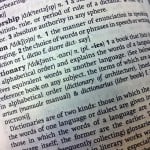Merriam-Webster caves in: “literally” now means “figuratively”
 Source: merriam-webster.com
Source: merriam-webster.com
The Merriam-Webster online dictionary’s definition for “literally” now includes a note on the ‘incorrect’ usage of the word:
2. : in effect : virtually
Since some people take sense 2 to be the opposite of sense 1, it has been frequently criticized as a misuse. Instead, the use is pure hyperbole intended to gain emphasis, but it often appears in contexts where no additional emphasis is necessary.
I know people who will literally start foaming at the mouth (hah) when people confuse the word “literally” with “figuratively”. However, this is English, and common usage dictates dictionary definitions – even if common usage is ‘wrong’. That being said, I’m surprised that the reason the definition was changed is claimed as “use of pure hyperbole intended to gain emphasis” – people say “I’m starving” if they’re very hungry, but the dictionary definition remains untouched for that word.
In the spirit of the English language, here are three more common words that used to have very the opposite meanings from their 21st century versions:
Terrific used to mean “horrible” or “frightful” (from the Latin verb terrere, ‘to frighten’. Nowadays it means the exact opposite – “great” or “wonderful”.
Manufactured used to mean “made by hand” explicitly. Again, from Latin manus (“hand”) and facere (“to make”). Nowadays it just means “made”, whether by hand or by machinery.
Awful used to mean, as the word itself implies, “full of awe” – as in, inspiring awe in a good way. Nowadays the word has a purely bad connotation – at some point, the word’s meaning remained the same but the connotation changed. The only way it has preserved its original meaning is mostly used in British English, as in “he has an awful lot of money“.
So, it just goes to show – sometimes English likes to mess with you.
